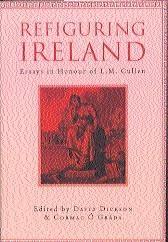Refiguring Ireland: essays in honour of L.M. Cullen
Published in 18th-19th Century Social Perspectives, 18th–19th - Century History, 20th Century Social Perspectives, 20th-century / Contemporary History, Book Reviews, Early Modern History (1500–1700), Early Modern History Social Perspectives, Issue 2 (Mar/Apr 2005), Reviews, Volume 13 Refiguring Ireland: essays in honour of L.M. Cullen
Refiguring Ireland: essays in honour of L.M. Cullen
David Dickson and Cormac Ó Gráda (eds)
(Lilliput Press, €60)
ISBN 1901866 84X
It is said that you can judge a man by the company he keeps. It certainly applies in the case of this volume of essays published to honour the work of Louis Cullen, one of Ireland’s leading economic historians. Not only have the editors been able to assemble contributions from leading scholars in the field of social and economic history but they have also succeeded in their aim of making the collection topical and provocative.
Based at Trinity College, Dublin, since 1963, Professor Cullen had by the beginning of the 1970s published three books on Irish economic history, including An economic history of Ireland since 1660. But Cullen felt that economic history could not answer all questions pertinent to Ireland, and so he turned also to social and political history, from a study of lower-class diet to popular politicisation. He also examined 1798, inspiring a new generation of historians to reassess this controversial episode of Irish history. More recently, Cullen has devoted his energies to the history of Japan, drawing out similarities between it and eighteenth-century Europe. His range is a testament to the universality of social and economic history, but it also reflects a prodigious talent, one that even now is making him one of the leading scholars of Japanese history.
At almost 400 pages, this collection is divided into three sections: ‘L’Ancien Régime’, ‘Loyal and Disloyal Subjects’ and ‘Measuring Modernization’. In his piece, Leslie Clarkson asks ‘did Ireland starve’ during the Great Famine? Rather than answer this directly, Clarkson emphasises that Ireland generally had been making economic progress since the seventeenth century, and that its patterns of famine were similar to those elsewhere in Europe, at least until the nineteenth century, when a population increase coincided with an increasing over-reliance on the potato, particularly among the poor. In his contribution, Seán Connolly compares the United Irishmen with a similar movement in Peru. Through a detailed comparison of the two, Connolly reminds us that such approaches to historical analysis are fraught with difficulties but that they can also be rewarding, if these difficulties are acknowledged.
Christopher Woods presents a neat summary of his recent work on the social composition of the Catholic Convention of 1792–3. In doing so, he dismisses the popular notion that this was an exclusively upper-class body of ‘Catholic country gentlemen’. As he demonstrates, only a third of the Convention’s delegates fit this description, with the remainder drawn from various grades of tradesmen, merchants and professionals, mostly from urban Ireland, particularly Dublin. With an eye more squarely on the aristocracy, Anthony Malcomson charts the continuous struggle of the Ely family to retain or recapture political prominence, from the seventeenth to the nineteenth century. At the level of individual families, power could not be taken for granted, a feature often overlooked when we categorise them all as the ‘Ascendancy’. Malcomson emphasises the importance of economic considerations, but is careful to highlight that such factors were not the sole determinant in achieving political influence.
In an essay titled ‘Ireland and the bigger picture’, Kevin O’Rourke champions comparative economic analysis over political history as a more instructive means of studying the past. Such an approach, he argues, does much to overturn claims of Irish exceptionalism, from social behaviour to fertility rates, to emigration and free trade. O’Rourke therefore challenges the importance many of us place on the actions of individuals, particularly those in government. And he is also sceptical of the importance of a peculiarly ‘Irish’ social and political culture, seeing instead underlying social and economic factors common to Western Europe. Although we must not all go the other way and sideline the relevance of political history and cultural studies, it is true that in Irish studies too much attention is given to them at the expense of social and economic history. This chimes with a recent call by Eric Hobsbawm for historians to return to ‘asking the big “why” questions’, and to move on from the current trend of identity history in which ‘my truth is as valid as yours, whatever the evidence’. In this vein, O’Rourke concludes his essay by arguing that the Celtic Tiger is not Celtic but European and transatlantic. Moreover, the economic boom of the past decade is typical of small economies playing catch-up with their larger neighbours, particularly within the European Union. Recent economic developments are also addressed in the volume by Kieran Kennedy.
Other chapters in the collection include T.C. Smout’s comparison of energy resources in Ireland, Scotland and Iceland; Tom Devine on ‘Irish and Scottish development revisited’; Bruce Campbell on canals and the economy; James Kelly on transportation from Ireland to North America; Mary Daly’s comprehensive yet concise essay on the modernisation of rural Ireland; J.-P. Poussou on Cullen’s impact on French history; Thomas Truxes on New York’s Irish merchants; Ann Kavanaugh on the radical poet Henrietta Battier; David Fitzpatrick on Harry Boland; Liam Kennedy’s highly useful cost-of-living index for Ireland, 1698–1998; Peter Solar on Irish trade in the nineteenth century; Andy Bielenberg on Irish distilling under the Union; and Cormac Ó Gráda on the Munster Bank. Ó Gráda also contributes to a chapter alongside Mairead Dunlevy, providing an interesting fusion of art history (painting supplied) with economic history.
The cumulative effect of this volume is to remind us of the central importance of social and economic history to our understanding of Ireland’s past.
Neil Fleming
















